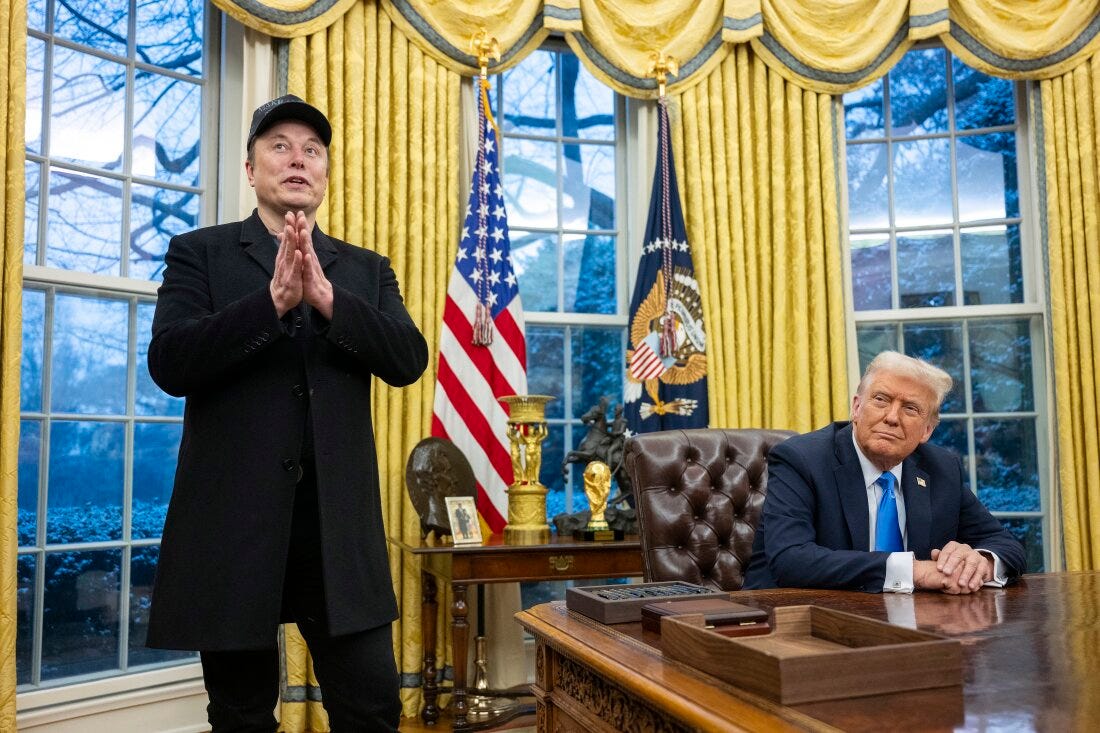DOGE has a gigantic motte-and-bailey problem
The motte and the bailey are trillions of dollars apart.
The motte-and-bailey fallacy (named after the motte-and-bailey castle) is a form of argument and an informal fallacy where an arguer conflates two positions that share similarities: one modest and easy to defend (the "motte") and one much more controversial and harder to defend (the "bailey"). The arguer advances the controversial position, but when challenged, insists that only the more modest position is being advanced. Upon retreating to the motte, the arguer may claim that the bailey has not been refuted (because the critic refused to attack the motte) or that the critic is unreasonable (by equating an attack on the bailey with an attack on the motte).
Let’s check in on a discussion that’s happening this morning in, I dunno, maybe six or seven million separate group chats around the world:
The Bailey: “Elon is going to cut $2 trillion from the Federal budget and reduce the deficit! I might not love everything the Trump administration is up to, but this seems like a great outcome.”
Somebody Else: “But isn’t $2 trillion more than all discretionary Federal spending programs put together? So they’d have to cut entitlement programs to get there, which they’ve promised not to do? Cutting the entire Federal workforce would only save about $300 billion annually. And didn’t Trump promise a $4T tax cut? How is saving a couple billion dollars at a time going to reduce the deficit when all that other stuff is happening… it seems mathematically impossible? It seems like Trump ran on policies that are destined to make the deficit explode upwards…?”
The Motte: “Things like ballooning administrative costs, rampant Medicare fraud, and absurd technological debt are huge multi-billion dollar problems in this country. Who could be against fixing this???”
Somebody else: “I mean, that’s fine and all. But you said they were going to reduce the deficit!”
I thought for a long while about why this whole form of argument rubs me the wrong way. And here’s the best answer I have: When a good thing (in this case, removing waste in government) is accomplished in the context of a gigantic lie that insults my intelligence as a citizen and as a voter, I’m not going to be as psyched about the good thing as I would otherwise be if they had played me straight.
Eliminating waste and needless bureaucracy is a worthy goal in its own right. I would argue that one of Trump’s best “innovations” is demonstrating just how little most administrative vacancies actually inhibit the smooth functioning of American society.1 There are many good arguments for small government.
But the administration does not need to brazenly lie about deficit reduction in order to make this point. These actions clearly cannot do enough to reduce the deficit by themselves, in a larger fiscal environment of looming tax cuts, static entitlements, rapidly increasing Federal interest expense. This doesn’t mean they’re not worth doing. But by making extravagant claims that it will accomplish the impossible, the administration makes itself appear untrustworthy, and irresponsible with the mandate they have been given by the voting public.
And yes, it was a mandate. But guess what — mandates don’t last forever. Right now prediction markets show a 79% chance of the Democrats retaking the House in 2026. In a thermostatic political environment where the Republicans desperately need to convince voters that Trump/Vance isn’t a total clown show, I do not believe that making promises they have no intention of delivering is a good way to engender that trust.
I imagine that DOGE will continue to dangle wins in front of the public — $15M in waste saved here! $50M in DEI programs eliminated over there! — and that will be fine and good. But let’s not let this distract us from the big issue: This is a pro-deficit administration until proven otherwise.
Except for the pandemic preparedness team, I suppose.





We need to stop using kingly words like "mandate" to describe what was by the numbers a narrow victory in a globally anti-incumbent election year.
Hillary Clinton won the popular vote by a wider margin in 2016 than Trump won it in 2024, and no one is using the word "mandate" to describe the decimation of the Clinton-Obama coalition that followed her electoral loss. The truth is that Trump squeaked by thanks to deep apathy among former Biden-voters and an electoral college tilt that typically favors red states. He still won, and that still matters, but political commentators and the general hand-wringing liberal public doesn't need to give him even more narrative power than he's already trying to seize.
Great post connecting an esoteric misconception to today's reality of ballooning deficit with less (not more) functionality.
> But the administration does not need to brazenly lie about deficit reduction in order to make this point.
Have you met the median voter?